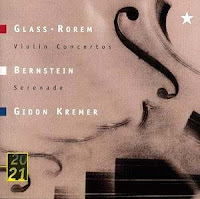 My run of American violin concertos is petering out. I didn't look particularly forward to listening to Philip Glass' first Violin Concerto (1987) and the experience left me cold indeed. It's a genuine mystery how someone is able to sustain a 40-year long, incredibly prolific compositional career on such a narrow basis. All the pieces I've heard (not very many: his early film scores, early solo piano work, the Low Symphony, Itaipu, The Canyon, ...) fit in exactly the same mould. Truth be told I haven't listened to any of his innumerable operas. By now Glass is at his Ninth Symphony and judging by the audio fragments on Presto Classical this recent work does not go in any way beyond the structural, thematic and textural parameters we have been familiar with for decades. Anyway, I listened to two recordings of this concerto but neither Gidon Kremer (supported by the Vienna Philharmonic and Christoph von Dohnanyi, on DGG) nor Robert McDuffie (with the Houston Symphony under Eschenbach, on Telarc) were able to convince me of the work's allure.
My run of American violin concertos is petering out. I didn't look particularly forward to listening to Philip Glass' first Violin Concerto (1987) and the experience left me cold indeed. It's a genuine mystery how someone is able to sustain a 40-year long, incredibly prolific compositional career on such a narrow basis. All the pieces I've heard (not very many: his early film scores, early solo piano work, the Low Symphony, Itaipu, The Canyon, ...) fit in exactly the same mould. Truth be told I haven't listened to any of his innumerable operas. By now Glass is at his Ninth Symphony and judging by the audio fragments on Presto Classical this recent work does not go in any way beyond the structural, thematic and textural parameters we have been familiar with for decades. Anyway, I listened to two recordings of this concerto but neither Gidon Kremer (supported by the Vienna Philharmonic and Christoph von Dohnanyi, on DGG) nor Robert McDuffie (with the Houston Symphony under Eschenbach, on Telarc) were able to convince me of the work's allure. The Telarc disc also contains a recording of John Adams' Violin Concerto which I revisited with considerable pleasure just a few weeks ago. I still prefer the Nonesuch recording where Kremer puts in a more imaginative performance.
Ned Rorem's Violin Concerto (1985) is the most attractive work on the DGG disc (which also contains the Bernstein Serenade). It's a six movement, symmetrically constructed, dusk-to-dawn piece that features some resourceful, mildly modernistic writing. Particularly the head and tail movements reconnect to the rugged feel of the Schuman concerto. The Romance without Words (third movement) makes an inevitable (it seems) reference to Coplandian pastoralism. The ensuing nocturne (Midnight), awash in floating, spectral chords transports us back to Vaughan Williams' most mystical and elated inspirations (Pastoral and Fifth Symphonies, for example). All in all this comes across as a product of good craftsmanship and I may pick up the competing Naxos recording if it ever crosses my path.
The Bernstein Serenade (1954) is a work that I yet have to discover. The composer's own recording with the Israel PO and Kremer as a soloist did not make a lasting impression. A few months ago I heard it in passing on Arte TV in a performance with the Mahler Chamber Orchestra and Patricia Kopatchinskaja (recording sadly no longer available) that I recall as more swinging and engaging.

Geen opmerkingen:
Een reactie posten